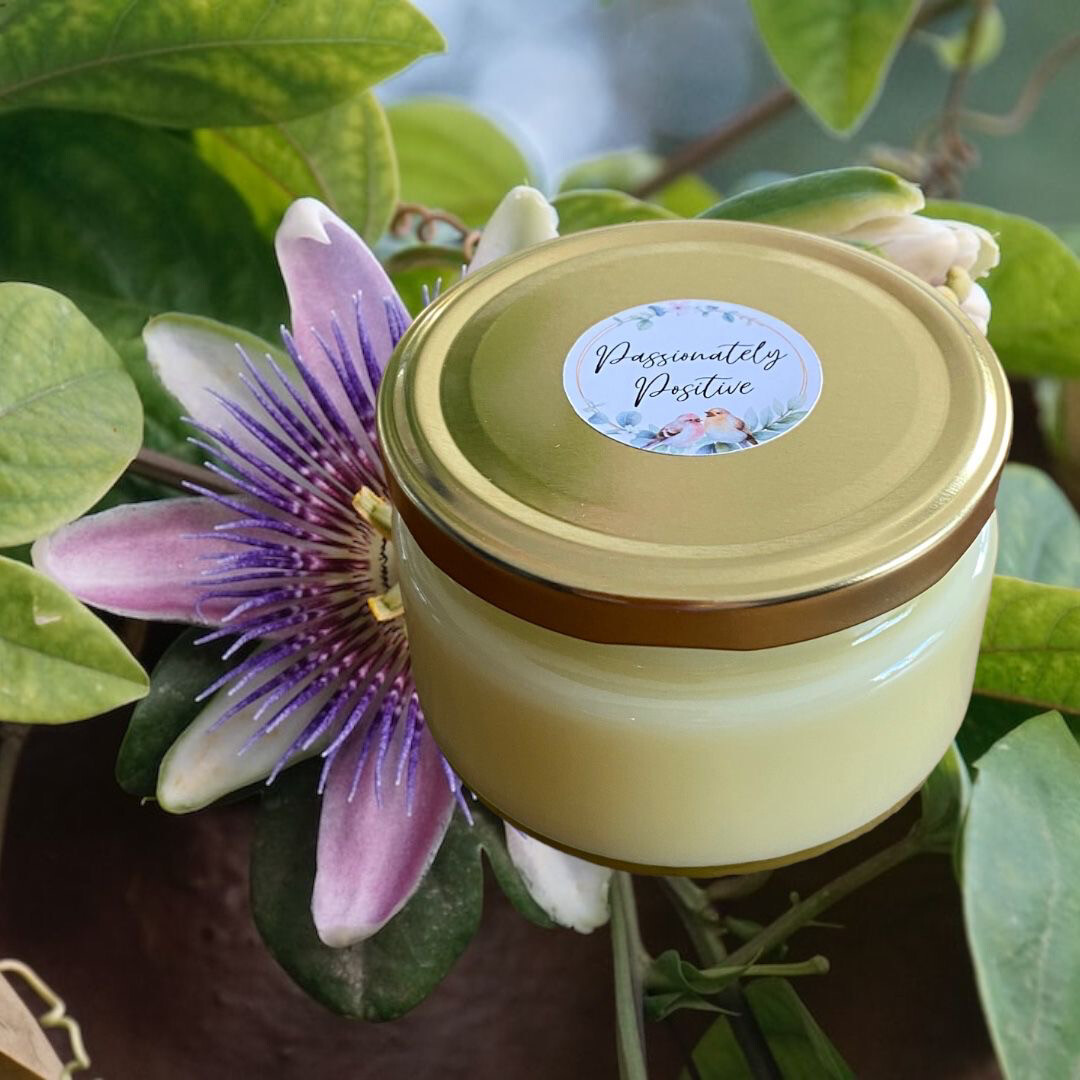Passionately Positive Balm 200ml
Passionately Positive 200ml
Passion Flower contains large amounts of GABA. GABA is an inhibitory neurotransmitter and its receptors are distributed throughout the brain, primarily in the basal ganglia and the cortex. GABA is responsible for calming excitatory action in the brain by buffering the neurotransmitter glutamate. When found in appropriate levels in the brain, GABA has muscle relaxant effects.
GABA also reduces hyperexcitability in the brain cells. This is directly correlated with the action of Passion Flower, because this excitability is responsible for such things as muscle cramps, seizures, anxiety, insomnia and other psychiatric disorders.
Passion Flower also contains many other active constituents including flavonoids, harmala alkaloids, maltol, lycopene, and certain flavonoid glycoside components. In addition to the GABA, these flavonoid glycoside components are credited with the sedative, analgesic and anxiolytic effects.
🪷Health Benefits of Passion Flower
1. A Mild Sedative. Passion Flower is both a sedative and anxiolytic. To clarify, not all sedatives have significant effects on anxiety. Passion Flower’s sedative effects mediate both anxiety and sleeplessness. This means that while it has calmative and sleep-inducing effects, it is also effective at reducing anxiety. Due to its sedative properties, it is primarily given to help with nervous restlessness Because it is not a narcotic, but rather a nervine, its effects are generally slower but work specifically on the nervous system. Two human trials have shown the sedative effects of Passion Flower to be equivalent to that of benzodiazepine drugs.
2. Reduces Anxiety. Multiple studies have been conducted which indicate Passion Flower is effective at controlling symptoms of anxiety. One study found it to have similar effects to the drug Oxazepam, though with fewer side effects. It has not been studied in children or adolescents [for anxiety], however, it shows promise for these groups as it is generally regarded as safe, and side effects are rare. The mechanism of action is thought to be the GABA content.
3. Controls Pain and Reduces Inflammation. In a study using mice, a species of Passion Flower (P. foetida) was used to look at the pain-relieving and anti-inflammatory effects. Both the leaf extract, and the ethanol extract showed significant pain reduction and anti-inflammatory effects. It is recommended for neuralgia-type pain.
4. Muscle Relaxant. Traditional-use data supports its action as an antispasmodic, meaning that it reduces spasms in the smooth muscles. This is partly due to its relaxant effects on the nervous system. Muscle-relaxant effects are listed in the traditional use data and are likely due to the harmaline content.
5. Combats Insomnia. Rat studies have found Passion Flower to be a significant sleep-inducer, and the study showed an increase in sleep time increments.
6. Fights Neuralgia and Seizures. Trials that induced seizures in mice found that a specific extract of Passion Flower delayed seizure onset and reduced the duration of seizures. The flavonoid Chrysin, which is found in Passion Flower has a depressant action on the central nervous system, which contributes to its relaxant action on the nerves. In another mouse study, the hydroethanolic extract of Passion Flower was found to significantly reduce seizure severity compared to the other groups (diazepam and placebo). Furthermore, Passion Flower was found to retain the levels of noradrenaline and serotonin in the brain, in addition to ameliorating the post-ictal depression that is a common post-seizure occurrence.
7. Effective for ADHD. In a small study done with children and adolescents with ADHD, Passion Flower was found to be just as effective as the drug methylphenidate at controlling ADHD symptoms, however, methylphenidate was observed to cause side effects such as loss of appetite, anxiety, and nervousness. Passion Flower did not demonstrate these side effects in as much frequency, leading the researchers to suggest Passion Flower as a potential treatment for ADHD.
8. Mediates the Symptoms of Opiate Withdrawals. In one double-blind study, opiate withdrawal treated with clonidine was supplemented with Passion Flower extract. Clonidine used alone for opiate withdrawal lacks efficacy in relation to mediating mental symptoms, [drug craving, anxiety, irritability, agitation, and depression]. When Passion Flower was added as an adjuvant, the efficacy for treating the physical symptoms of opiate withdrawal was equivalent to Clonidine, but with the added benefit of mediating mental symptoms.
9. Acts as a Cardiac Tonic. Passion Flower has shown enhanced exercise capacity in those with Congestive Heart Failure, and improvement in symptoms in individuals who have taken the combination extract. It is unknown whether the effects are attributed to Passion Flower . Passion Flower is usually used in combination with other herbs, so the effects are often considered synergistic by herbalists.
10. Balances the Symptoms of Spasmodic Asthma. Traditional-use data supports the use of Passion Flower to help alleviate the symptoms of spasmodic asthma. The nervine action and influence on GABA receptors from Passiflora are likely the mechanisms behind its soothing action on asthma symptoms. There is a direct relationship between stress, anxiety, and asthma symptoms. When stress and anxiety is mediated, asthma symptoms have been shown to decrease.
Nb: Not to be used during pregnancy or breastfeeding.
£3 from every balm to be donated to mental health charities.

